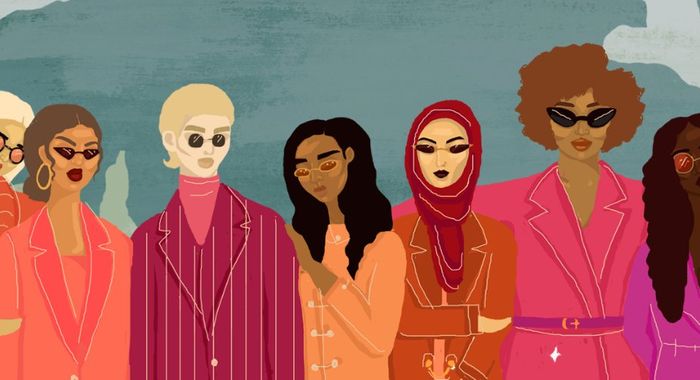The Unexpected Border: Accessing Medical Care When Claiming Sexual and Gender Identity Asylum
The second article in our 'Build Love, Break Walls' series I took at look at the barriers LGBTQ+ migrants face when seeking medical care in the UK. Featuring interviews from migrants and Doctors of the World.
Sarah was at work one day when she received a call from her neighbour. Her heart sank when she heard what the woman was asking her: “Are you a lesbian?”. Sarah choked out a “No”, before the neighbour continued: “everyone is here, they are beating up your girlfriend, they are destroying your house, they have pictures of you and your girlfriend”. The neighbour then put the phone on loudspeaker so Sarah could hear for herself what the mob was saying:
“Where is she? We are going to kill her before the police come. The police have taken one, but the other one, we will kill her before they come.”
It was at this point that Sarah realised she needed to get out of Uganda.
Sarah’s story is not uncommon, over 2000 people apply for sexual and gender asylum every year in the UK and four out of five of these claims are rejected. While this number isn’t necessarily higher than that of those who apply for other reasons, there are certain obstacles that are unfortunately exacerbated when applying on these grounds. The stringent ‘proving’ process engenders a system of disbelief and misunderstanding, where the person applying for asylum is unaware of their rights or the correct avenues to pursue in order to attain them. Furthermore, while the situations of many people seeking asylum can be traumatic to recount, for those seeking asylum on gender grounds or due to sexual orientation this might be the first situation in which they (might) tell their story: that is, if they even have the language to do so. This extra barrier makes the role of an advocate even more imperative. In the past this role was often occupied by doctors, as they represented a non-threatening state figure operating within the system, making them ideally suited to offer advice and signpost people to the correct services. However, since the introduction of ‘Hostile Environment’ in October 2017, getting vulnerable migrants’ access to medical care has become increasingly difficult.
‘Hostile Environment’ directly disrupts access to healthcare by enforcing the policy that secondary care (not the first point of contact i.e.: GP or A&E) bills must be paid prior to treatment and at 150% of the normal NHS rate. There is a clause, however, that states that this may be waived if the treatment is ‘urgent and necessary’, but this is enforced at each hospital’s discretion. A knock-on effect of ‘Hostile Environment’ is that NHS trust administrators have been putting “undue influence” on medical professionals to classify treatment as non-urgent, according to a 2019 report by the BMA (British Medical Association). Access to GPs falls under primary care, which everyone in the UK is entitled to even while they are seeking asylum. However, due to the vague wording of Home Office legislation, and pressure from administrators, many people are being refused care. ‘Registration Refused’ is a yearly report produced by Doctors of the World, a charity which provides support to those who would otherwise find it difficult to access medical care. It showed that in 2018 one fifth of patients were refused registry, even when supported by a volunteer, (numbers are supposed higher when unaccompanied) all for reasons that go against NHS guidelines.
The most obvious result of this is the continued suffering of those turned away or saddled with crippling bills. This also disturbs access to medication, affecting outstanding issues such as diabetes and depression, but also access to the necessary hormone drugs for those transitioning. For people who can already suffer from body dysmorphia, this separation can cause them to seek potentially dangerous drugs outside normal routes and can also make talking about their experience, so linked to their bodies and experience, even more difficult.
Another group especially affected are pregnant women, due to the fact that after 2014, antenatal care became chargeable. While most women will not have to pay until after the baby has been born, they will receive the letter prior to treatment. This figure, which for an uncomplicated pregnancy is £7,000, often scares women from having treatment altogether. It’s these women, who often walk out of clinics after hearing the figure, that are at the most risk. Bettina Wanninkhof, a volunteer midwife for Doctor’s of the World, says:
“Those are the ones I really worry about at night – where has this girl gone?”
Furthermore, if a person owes more than £500 pounds to a hospital for more than two months, the hospital can contact the Home Office with this person’s details, using the debt for immigration enforcement. While some hospitals will set up manageable payment options, this is at their discretion, and in some cases useless as no money can be paid at all.
Due to the practice of correctional rape in some home countries, Doctors of the World treat large numbers of LGBTQ+ people who are pregnant. Claire van Nispen Tot Pannerden, who runs their Women’s and Children’s centre, states that “Stories, even as awful as they are, are relatively similar. Women who have been forced into marriage at an early age, non-consensual sex often, have had several children often, at one point in their life had been found to have a relationship with somebody of the same gender, and then were persecuted and abused. Corrective rape is something that we hear about very often. For their own safety they had to flee and leave everything behind.” Bettina recounts a pregnant woman coming into the clinic late on a Friday, whose story was confused. After Bettina enquired about the father, there was a long silence and the woman said in a very small voice “I was raped.” The woman, Bettina states, eventually told her story, which was that: “It came out that she was gay and had been picked up by the police and correctively raped, so she ended up pregnant.” This woman was then able to see a specialist midwife who deals with abuse, an appropriate councillor and receive her right to remain relatively quickly. This woman’s story may have been drastically different had Doctors of the World not been there to hear her story, in an open environment without pressure or judgment.
Denying this first point of contact for someone claiming sexual or gender asylum can be disastrous. Martina Villa, Communication Executive at Doctors of the World, reiterates the point above, stating that “We try to support people and build up their confidence.” Claire reaffirmed this position, saying that in her experience Home Office interviews are “very sterile, there’s no empathy. It’s not a therapeutic session, so they want to know the facts. But the facts are horrible – if there’s no aftercare or care in the conversation, I’m not sure how they take place.” Access to a GP can also provide mental health support and help patients deal with trauma; without this first meeting, most people won’t know that they are entitled to this care. Claire states that all patients she sees need some sort of care:
“they all have a very traumatic past. Leaving scars in mental health but also leaving a lot of physical scars”.
Another key service offered by GP’s is providing evidence of a medical reason which can be used as a reason to stay, or attestation of past trauma. While better access to health care is not enough of a reason to claim asylum, if someone presents with a condition and sending them back to their own country would be “inhumane and degrading” they can be allowed to remain for treatment (case of D v UK (St. Kitts) [1997]).
However, this should not be used as evidence for ‘health tourism’. As stated repeatedly by Doctors of the World’s employees and volunteers, on average, people who seek help from their organisation have been in the country for more than five and a half years before coming to them. They also commonly aid people who previously had been issued right to remain status, but fell behind on their paperwork, and have therefore had their status revoked. It is then impossible for these people to work, rent accommodation and consequently access medical care.
The ‘Hostile Environment’ has yet to show signs of saving money as the astronomical cost of administration, especially for overseas claims, is eating up any potential profit. These costs are also about to get much higher. Shortly after winning the election Boris Johnson circulated a memo around hospitals managers urging that they should prepare to charge EU nationals after Brexit for their healthcare. The organisation of this would be an enormous undertaking and, as disclosed in a Victoria Derbyshire report, would also encourage damaging racial profiling. As one of the administration officers commented:
“if you had John Smith vs Mohammed Khan, and you don’t have time to write to both, you go for the Mohammed Khan”.
Furthermore, it has been suggested that this upfront charging for specific groups encourages an easier transition to privatising the NHS, (on top of the 8-22% of NHS annual budget that is already given to private companies). Therefore, while ‘Hostile Environment’ has enormously adverse ramifications for LGBTQ+ refugees, the knock-on effects are much wider.
Sarah, who we heard from at the beginning, managed, with the support of Doctors of the World and LGBTQI+ charity Say It Loud Club, to register with a GP, access medication and even have two valves replaced during heart surgery, all free of charge. She is currently waiting on the outcome of her asylum claim, however access to medical care has wildly improved her quality of life while she is going through this incredibly stressful time. The system is not completely broken and does allow those seeking gender and sexual asylum, alongside other claimants, the support and care that they need and require. However, it seems that this window of opportunity is closing, and the effects of Hostile Environment won’t only apply to those seeking asylum, but to all those living in the UK.

